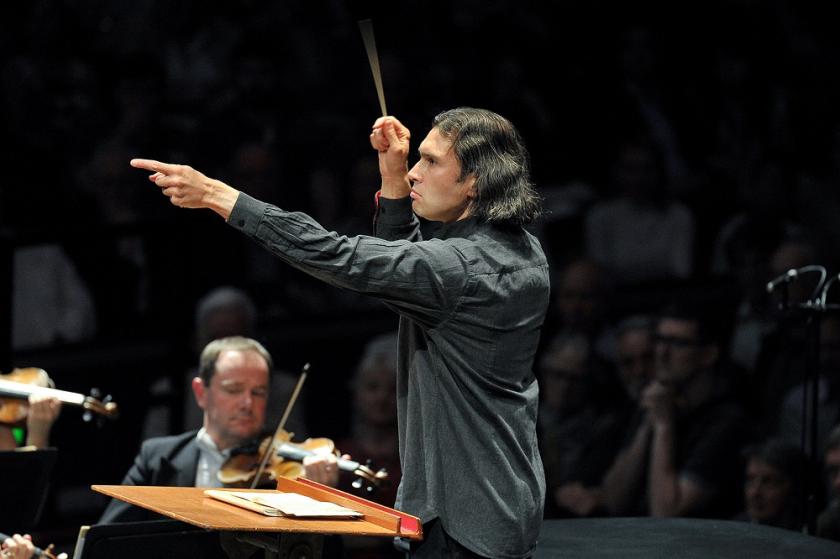In recent performances of the First Symphony under Markus Stenz and the Seventh under Jaap van Zweden, the LPO have burnished their credentials as London’s best Beethoven orchestra. With the low-key oversight of Vladimir Jurowski, they took the Sixth to another level, perhaps the level at which the twentysomething tyro Berlioz heard the symphony and said, "I must write that for myself". And with the Symphonie fantastique, he did.
So much was unremarkably right. The speeds, just a notch under the composer’s metronome marks, proceeding at a gentle canter with the steadiest of pulses that revealed, in the first movement, Beethoven as the first Minimalist, stripping back all harmonic tension to focus on shifting screens and patterns. These in turn could only achieve equilibrium thanks to an orchestral world held in perfect balance. We could hear as well as see the solo cello (Kristina Blaumane) play along with unmuted violas for most of the "Scene by the Brook" or an octave below the violins, set loose from her companions.
The instruments which enter one by one in the last three movements – trumpet, then piccolo, drums and trombones – each brought a new colour to the canvas. The Storm was no mere scene-painting but every bit the psychic disturbance that can only be calmed by the finale’s Thanksgiving hymn.
Has the Festival Hall heard a ‘Pastoral’ of greater psychological depth and spiritual exaltation since the days of Klemperer? Surely not, at least since this orchestra played it under Klaus Tennstedt in a 1992 performance happily released on its own label. The microphones were here again. With any luck you may judge for yourself, one day.
Counterpoint became heterophony – order turned to chaos The programme for the night proudly referenced Geoff Brown (of this parish): “Jurowski can summon a packed house to hear anything he conducts with the LPO, however unfamiliar.” And it was so. The hall was full for the first performance of Alexander Raskatov’s Green Mass: his second LPO commission, after A White Night’s Dream (2010) and lavishly financed, to judge from the plus-sized Missa solemnis proportions of the work and its forces. A structure which intersperses the Latin text with poetic commentaries places Raskatov in a tradition of works such as Janáček’s Glagolitic Mass and Julian Anderson’s Heaven Is Shy of Earth, where Christian theology is addressed inquisitively: Yes, but also, they seem to say.
A richer engagement with the implied ecological subtext of a Green Mass was hard to discern from a mosaic – patchwork? – of ideas, most of them as short as they are simple, as sincere as they are unmemorable. Raskatov (pictured below) is not the first composer hamstrung by the verse-narratives of the Gloria and Credo, nor will he be the last to attempt a unifying gesture with a rhythmic tattoo on their titles.
 There is even a nod to the grand choral fugues which have rounded off those movements ever since Bach, but too much is a dutiful procession of doctrine, set line by line and rarely with space for contemplation. Counterpoint became heterophony – order turned to chaos – in the joyful dance of “Et resurrexit”, perhaps intentionally so: the Choir of Clare College seemed on top of their parts, as much as one could hear them over the LPO at full strength, with eight busy percussionists, two keyboard players and a pair of electric guitars. I think I saw Uncle Tom Cobleigh at the back of the strings. Whatever else it is – spiritually uplifting or stultifyingly banal according to taste – the Green Mass is grossly over-scored.
There is even a nod to the grand choral fugues which have rounded off those movements ever since Bach, but too much is a dutiful procession of doctrine, set line by line and rarely with space for contemplation. Counterpoint became heterophony – order turned to chaos – in the joyful dance of “Et resurrexit”, perhaps intentionally so: the Choir of Clare College seemed on top of their parts, as much as one could hear them over the LPO at full strength, with eight busy percussionists, two keyboard players and a pair of electric guitars. I think I saw Uncle Tom Cobleigh at the back of the strings. Whatever else it is – spiritually uplifting or stultifyingly banal according to taste – the Green Mass is grossly over-scored.
Iestyn Davies and Mark Padmore made mellifluous sense of their interpolations, setting Blake and Trakl respectively. To the bass Nikolay Didenko was given “Human life is papered thick and grey with boredom / the transparent ‘no’ of its windows.” Forty minutes in and only halfway through, it was hard not to sympathise with Velimir Khlebnikov’s poetic butterfly, but the buzzing cimbalom accompaniment suggested a wasp trapped in a casement.
Something was lost in translation, both from Russian to English and words to music. Elena Vassilieva has years of experience singing Raskatov’s music to call upon but also, alas, no longer more than a frayed thread of soprano, exposed by the microphone and stretched to its limit, sometimes beyond, by some cruelly pitched writing. The final insertion was placed before the "Agnus dei", a setting of the Prayer of St Francis for a capella quartet and wind chimes that did not so much embrace cliché as welcome it at the door, show it a bean-bag and roll it a joint. I had never heard a world premiere die away to the clipped heels of departing patrons. There is, however, a first time for everything.














Add comment